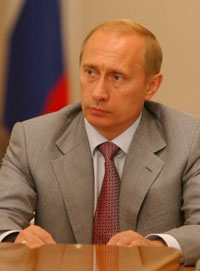Putin makes proposal on Iran's nuclear program

Iran ’s top leader has received an unspecified proposal concerning Muslim country’s nuclear program from President Vladimir Putin at a private meeting, Iran's state news agency said Wednesday.
Russian officials could not immediately be reached to verify the report and the Iranian news agency provided no details on what Putin had proposed.
The supreme leader, Ayatollah Ali Khamenei, told Putin in turn that Iran avoids adventurism and cooperates with the U.N. nuclear watchdog, but is serious about continuing with uranium enrichment, the news agency said.
Khamenei, who has the final say on all government matters in Iran, said Iran will give Putin's proposal serious thought before giving a response, the news agency said.
"We will ponder your words and proposal," IRNA quoted Khamenei as saying.
Officials close to hard-liners within Iran's ruling Islamic establishment said they believed the proposal by Putin was a type of "timeout" on sanctions against Iran, if Tehran suspends uranium enrichment.
The five permanent U.N. Security Council members, plus Germany, have been working together to try to find a way to get Iran to abandon its disputed uranium enrichment program.
"The main reason for Putin's visit to Iran was to convey this message personally to the ultimate power in Iran," one official close to hard-liners said on condition of anonymity.
Putin's visit, during which he met with Iranian President Mahmoud Ahmadinejad and attended Tuesday's summit of Caspian Sea nations, was a first. No Kremlin leader has traveled to Iran since Josef Stalin in 1943, for a wartime summit with Winston Churchill and Franklin D. Roosevelt.
Before visiting Iran, Putin held extensive talks on Iran's nuclear activities with some Western leaders including French President Nicolas Sarkozy and German Chancellor Angela Merkel.
Putin has bluntly spelled out his disagreements with Washington, saying last week that he saw no "objective data" to prove Western claims that Iran is seeking nuclear weapons.
At talks Friday with U.S. Secretary of State Condoleezza Rice and U.S. Defense Secretary Robert Gates, he ridiculed U.S. plans for a missile defense system in eastern Europe, supposedly to stop an Iranian attack.
On Tuesday in Tehran, Putin warned the United States not to use a former Soviet republic to stage an attack on Iran.
Iran insists the nuclear program is only fordeveloping energy, and it has touted the program as a sign of its technological prowess. But the United States and its allies contend Iran is secretly pursuing nuclear weapons.
The Security Council permanent members group in June 2006, offered a package of economic and political rewards to Iran and a suspension of the implementation of sanctions, but only if Tehran agreed to suspend enrichment before the start of negotiations. Iran rejected that proposal.
The U.N. Security Council imposed sanctions on Iran in December for refusing to suspend enrichment, and modestly increased them in March after Tehran stepped up the program. Iran responded by giving the U.N. nuclear watchdog less access to its nuclear facilities.
IRNA, the official news agency, reported Wednesday that Khamenei had told Putin that U.S. demands had no limits but that Iran won't seek adventurism.
"Iran ... has chosen a lasting logic in defending its national interests because it is certain that excessive demands of the enemies of this nation has no limits.
"Due to this reason, the Iranian nation and government, while avoiding adventurism and not giving pretexts to the enemy, will pursue this wise logic," IRNA quoted Khamenei as telling Putin.
Khamenei also said Iran will continue cooperation with the U.N. nuclear watchdog, the International Atomic Energy Agency, to scrutinze Iran's nuclear program.
"Iran's cooperation with the IAEA is a logical and correct path and will continue. We are determined to meet our country's need for nuclear energy. That's why we are taking the issue of enrichment seriously," IRNA quoted Khamenei as saying.
Khamenei said an "independent Iran" was in the interest of Russia, while a "powerful Russia" served the interests of Iran.
Russia has resisted the U.S. push for stronger sanctions against Tehran and strongly warned Washington against using force against Iran.
But its position is carefully hedged: It has delayed completing the Bushehr nuclear power plant, Iran's first, and is urging the country to comply with international controls on its nuclear activities.
Putin refused to set a date Tuesday for the start-up of Iran's first nuclear power plant, but stressed that Moscow would not back out of its commitment to complete the project.
Setting a date by Putin to quickly complete the power plant could embolden Iran and further cloud Russia's relations with the West.
Subscribe to Pravda.Ru Telegram channel, Facebook, RSS!




